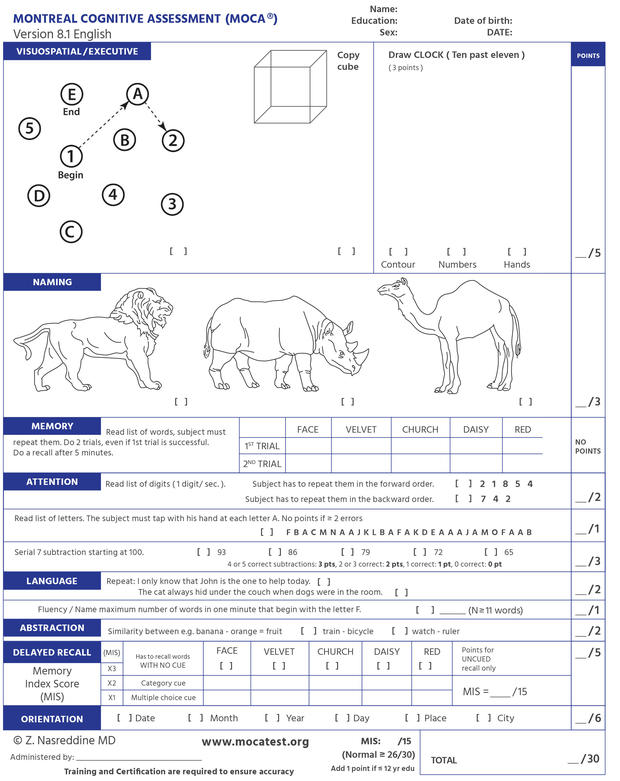

Here are the advantages and disadvantages to consider for each screening tool:
#MOCA TEST SCORING INTERPRETATION HOW TO#
In the next article for this two-part series, I’ll discuss why it’s important to gather information regarding possible dementia and how to use this information. These screening tools aren’t designed to diagnose cognitive functioning, but SLPs can use them to determine if a person’s cognitive function warrants further testing. In other words, each one offers its own set of pros and cons. Quick, easy to use, and readily available online for free, each of these screens provides different psychometric properties, organization, and administration. I like three tests: the Mini-Mental Status Examination (MMSE), Montreal Cognitive Assessment (MoCA), and Saint Louis University Mental Status (SLUMS) exam. The first step I take in determining a person’s cognitive status involves using a standardized screening tool. For this first article, however, I wanted to discuss the first steps. I will deal more in-depth on how and why determining cognitive function helps guide my treatment strategies in an upcoming post. We will consider the feedback we receive through the survey in determining next steps – please provide your feedback - access the survey here.Working with older adults as a speech-language pathologist for a rehab company, I often assess patients on their cognitive function.

In response to this announcement, OSOT has launched a survey of our members to identify if there is a demand for a group benefit discount for members.
#MOCA TEST SCORING INTERPRETATION PROFESSIONAL#
Some are researching alternative assessment tool options others have identified funds and are progressing with certification and others need to consider how they use the MoCA and if it will be part of their professional development for the upcoming year. OT is only one of several professions (nurses, speech language pathologists, neurologist, family physicians, psychologists, etc.) to be able to administer the MoCA so organizations and individuals are currently deciding how to address the change. The training and certification takes approximately one hour to complete and you have 3 attempts to successfully complete the certification test. This mandatory training and certification process will cost $125 USD (approximately $160 CAD) which will have a significant impact for organization/department budgeting and for independent practitioners. Occupational Therapists are required to have adequate knowledge, training, skills, and judgement to perform tasks required to competently perform their jobs, therefore, after September 1, 2020, you would be at increased risk of liability should you administer the MoCA without certification. If you wish to continue using the MoCA Test without being officially trained and certified, you will be at increased risk for administration, scoring and interpretation errors which could lead to misdiagnosis and liability.” ( /faq/ - Is Training and Certification Mandatory?) Implications for Occupational Therapists You will have one year to complete MoCA’s Official standardised training and certification program. If you need immediate access to the test, you can select the button: "I am certified or will complete my certification before September 1st 2020" on the MoCA Paper Test page. “ To ensure consistency and accuracy, training and certification to administer and score, the MoCA Test will become mandatory.Īfter September 1st 2020, access to the test will be restricted to officially certified users (except exempted users, see below). Recently, the creator has communicated that: Occupational Therapists are one of several professions permitted to administer and score the MoCA. It includes subtests for short-term memory visuospatial abilities executive functions attention, concentration and working memory language, and orientation to time and place. The Montreal Cognitive Assessment (MoCA) is a tool commonly used to assess cognitive impairment. Montreal Cognitive Assessment (MoCA) Announces Upcoming Changes


 0 kommentar(er)
0 kommentar(er)
